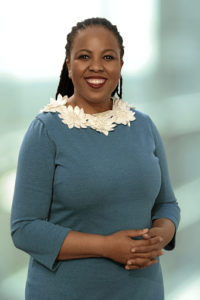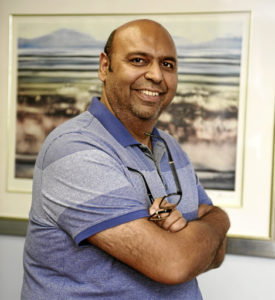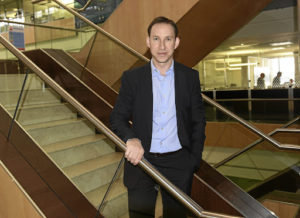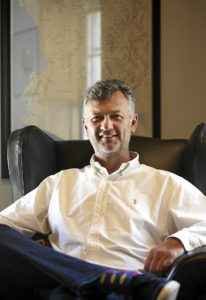The rise of the super-app and competition outside the traditional banking sector raises questions about the longevity of the traditional banking model. The future, it seems, is decidedly digital.
Is it any surprise that banking is considered a low-growth, perhaps even ex-growth, industry? In recent years, banks have been vastly overshadowed by the growth of the big technology companies which, through the likes of Apple Pay, are already eating into their lucrative fees. In the US, the large banks — including Wells Fargo, Bank of America and Citi — together have a total value of about $2.2-trillion. But four companies that hardly existed in 2000 — Google, Amazon, Facebook and Apple — have a total value of $5.6-trillion.
Jamie Dimon, CEO of perhaps the most blue-chip bank on the planet, JPMorgan, says: “Banks are playing an increasingly smaller role in the
financial system.”

To Funeka Montjane, head of Standard Bank’s consumer and high net worth business, this illustrates that banks cannot afford to stick to their current business model of taking deposits and lending money. The legacy banks are in real danger of losing clients to competitors on all sides — whether it is to the new challenger banks such as TymeBank or Bank Zero, focused lending businesses such as Lulalend, or the transactional arms of the big tech companies such as Apple Pay and Google Pay.
Today, “fintech companies” — which focus on the intersection of banking and technology, largely around payments — are far more highly prized by investors. It means there’s a danger that banks will be disintermediated from clients who will no longer look to them directly for loans.
Take WeBank, based in Shenzhen, China. It acts as a conduit for loans provided by partner banks. WeBank is part of the Naspers associate Tencent, which owns the customer relationship. In many cases, the clients don’t know, or care, which bank ultimately stands behind the loan.
For existing banks, it has been a big shock to the system.
Here in SA, the big four — Standard Bank, Absa, FNB and Nedbank — claimed for years there was no demand for anything other than what they were offering.
But the arrival of Capitec in 2001 felled this myth. It charges only a flat management fee of R5 to all clients, and has snapped up more than 16-million clients. And it’s done so at the expense of its bigger rivals.
The risk is that if the big banks don’t respond fast enough, they’ll lose the best business to their nimbler competitors, leaving them with the riskier clients. There is still time for them to change course, however.

Kokkie Kooyman, who runs the Denker Global Financial Fund, says there is no evidence that the large US tech companies have any desire to set up banks in SA and subject themselves to local regulators. And, he says, the regulator, the Prudential Authority, will staunchly support local banks against threats to the status quo, such as the wholesale introduction of cryptocurrencies.
Still, they can’t afford to be complacent: banks need to offer a seamless digital service, and learn to leverage their huge data assets.
Chris Steward, banking analyst at Ninety One, says banks need to repurpose themselves for a world with much less paperwork. Many bank branches are still configured for the days when large amounts of manual tasks were carried out in the branch.
Platform banking: silver bullet or fad?
The silver bullet often touted is “platform banking” through super-apps — mobile applications that provide multiple services in a self-contained online platform.
Standard Bank, Nedbank and FNB are scrambling to become “platform organisations”, offering their own and other nonbanking services to customers through an online platform, while still running branch networks.
Nedbank CEO Mike Brown argues that clients expect their bank to support the full range of their lifestyle.
This is why Nedbank has launched its super-app, called Avo, which retail banking head Ciko Thomas would like to have “anything legal” on offer.
Its predecessor 100 years ago was the Sears Roebuck catalogue, which offered everything from high fashion to power tools for farmers in the
remotest corners of thinly populated US states such as North Dakota and Wyoming.
For Standard Bank, which has a wide footprint across Africa, such a platform would be larger than even the Sears Roebuck catalogue. It means the bank can help small farmers in Uganda get access to good-quality maize seeds, for example.
For the banks, the main benefit from super-apps comes from what is known as embedded finance. The platform will get a nominal commission if a large flat-screen TV is sold on its platform, for example. But the real gravy comes when, with just a couple of additional clicks, the product is added to the customer’s insurance policy or a loan is given to pay off the TV over three to six months.

FNB CEO Jacques Celliers believes that “super-app” is an overtraded term.
“For us it isn’t about the app, but more about what’s behind the app,” he says.
Celliers believes the focus should not be on attracting eyeballs, but on generating meaningful activity and data points. He says that unlike the new disrupters, FNB has a huge trust relationship with its clients, built over 183 years.
“It is no different from a bicycle manufacturer which has built up a reputation for reliability over more than a century, even if the product itself looks completely different, and uses entirely different materials.”
Celliers argues that FNB already has quite a few of the building blocks for platform banking through its eBucks loyalty programme. It is already the largest travel agent in the country, thanks to the range of flights and hotels available in its “catalogue”.
And it is hard for any app to compete with its banking app when it comes to the number of logins — FNB has more than 130-million a month.
“As there are more and more untrustworthy websites, providing fake news and disreputable offers, the banking app provides considerable trust and security,” says Celliers. “We certainly wouldn’t abuse the trust of our clients. For example, we would never set up a dating site. That would be a significant ethical breach.”
But part of the problem for banks is that, if anything, the telecoms companies are better placed to set up super-apps. Without the minimum capital pressures of banks, they are better able to tolerate the costs of running super-apps before they turn profitable.
In recent months, Vodacom launched VodaPay. After just one month’s trading, it has more than 500,000 customers. That makes it larger than Nedbank’s Avo, which has been in business for 18 months.
VodaPay also has access to 40-million clients — and more than 500-million in the wider Vodacom group, now that the Ethiopian and Egyptian businesses are coming on board.
Mariam Cassim, head of financial and digital services at Vodacom, says: “It is a pleasant experience in its own right, while other super-apps [such as Avo] are designed to meet a single need, such as calling a plumber.”
VodaPay partners with Bidvest on savings and deposits, and with Lulalend on loans. Niche brands such as women’s clothing boutique Michelle Ludek, which may not get prominent spots in physical malls, flaunt their brands on VodaPay.
Cassim says that because Vodacom has millions of clients at both ends of the income spectrum, it is better placed to span the entire market — from basic cash-based services to sophisticated virtual malls.
Nedbank’s Avo is certainly trying to be as comprehensive as VodaPay, and isn’t just open to Nedbank clients: 35% of its business is with clients of other banks.
Brown told a recent UBS conference he expects Avo to be a virtuous circle or “flywheel”, along the lines of Uber. If it can prove it has customer utility, it will continue growing in transactions and advertising revenue, and will attract more merchants.
Deep relationships, not superficial hook-ups
However, The Economist magazine recently ran a column debunking the myth of flywheel businesses.
The nine ride-hailing and delivery businesses listed on stock exchanges so far — including Uber and Lyft — have racked up operating losses of $11.5bn. And loyalty is also a myth: passengers often switch between the two largest platforms.

Absa is the only big SA bank that is sceptical about super-apps.
Christine Wu, Absa’s head of digital services, asks: if a bank’s super-app offers a platform to every plumber and electrician in the neighbourhood, who is the customer going to blame if they have a bad experience?
“We simply don’t have the experience or the resources to provide the safeguards which Amazon can provide on its products and services,” she says.
According to Wu, the super-apps set up by Tencent and Alipay in China look impressive, but they cost $15bn to launch. They could take years to provide a return on investment.
It’s more realistic, she says, to have a few closely monitored partnerships intimately tied to Absa products, such as Private Property, the national real estate website.
“We believe in deep relationships, not in thousands of superficial hook-ups,” she says.
Wu believes it’s best for banks to focus on their core financial services products. So Absa is going another way: it plans to embed more financial advice in its app and is redesigning its stockbroking website to enable more self-service of unit trusts, shares and exchange traded funds.

Bank Zero CEO Yatin Narsai also believes platform banking is simply a distraction. “The priority should be to make the core banking proposition competitive and to cut overheads to make this possible,” he says.
Denker’s Kooyman believes the best example of a super-app produced by a bank is from Russia’s Tinkoff Bank, now the world’s largest digital-only bank, with 12-million primary customers.
It was founded in 2006 and has no branches. Its main nonbanking services are hotel bookings and movies, as well as package holidays booked through Tinkoff Travel.
Yet investors treat Tinkoff more like a tech company, as its shares trade at an expensive p:e of 22 — more in line with a firm such as Amazon than a bank.
The top-rated large SA bank, FirstRand, trades on a p:e of about 12.
Given the premium paid for fintech firms, it is perhaps not surprising that Celliers sometimes quips that FNB shouldn’t be called a bank any more, but a digital platform.
The reaction to Tinkoff by the main Russian incumbent bank, the state-controlled SberBank, echoes Standard Bank almost word for word.
Last year, SberBank said it wanted to transform into an ecosystem, offering movies, music, food delivery, cloud storage and taxi bookings. The only problem is that this is 14 years after Tinkoff entered the market.
Still, with a 36% share of the Russian banking market, Sber can afford to employ the best data scientists and internet marketing specialists. Its online portal has received good reviews and could start to make Tinkoff’s life difficult.
So it’s still too early to make a call on who will win this race.
No threat yet

As it stands, SA’s challenger banks have yet to prove a threat in the secured finance units, such as mortgages and vehicle finance. Even Capitec has made only tentative steps into these sectors, through partners such as SA Home Loans.
But TymeBank CEO Tauriq Keraan says the legacy banks would be complacent to think the challengers will remain skinny, with limited products.
“New banks have the opportunity of offering home loans and vehicle finance by partnering with other players,” he says.
Through its “buy now, pay later” option, and recent partnership with TFG, TymeBank now has a strong foothold in consumer finance.
Just last week Naspers/Prosus CEO Bob van Dijk said he expects the “buy now, pay later” option to lead to a significant increase in online purchases on its payment businesses worldwide.
Discovery Bank, part of Adrian Gore’s Discovery Group, is one of the newer banks with plenty of potential to snap up tech-savvy customers.
Its Vitality chassis, which began as an add-on to the Discovery medical aid with the goal of inducing behavioural shifts, is, in many ways, the precursor of the current super-apps. For years, it has been partnering with cinema chain Ster-Kinekor, gym group Virgin Active and airline kulula in offering discounts.
Its bank follows the same “behaviour economics model”, rewarding “good behaviour”, such as saving more and not abusing credit, with lower costs and better interest rates.
Still, Discovery Bank was criticised for paying more than R4bn for an old-school SAP core banking system — considered an anachronism in today’s cloud-based software world.

Discovery Bank CEO Hylton Kallner argues that the bank’s technology stack is built on a modern and agile yet robust platform, able to support a full range of products, from credit cards to savings products and foreign exchange.
“Our core banking system therefore had to be fully scalable and robust and was developed on the latest SAP platform at a fraction of the cost of traditional systems,” he says. “The system is delivering the most robust performance in the market currently.”
Kallner says the system handles more than 150,000 transactions a day with virtually 100% uptime, no failures and the highest levels of security.
The bank, he says, can also rapidly roll out significant product enhancements: this year, it was the first bank to introduce Apple Pay. It also released a financial analyser tool, and developed forex solutions.

Bank Zero chair Michael Jordaan believes it’s a not a binary choice between established and digital banks.
“We know the majority of Bank Zero customers have kept the accounts at their original banks. Many clients are still prepared to pay for the rich functionality of the legacy banks,” he says. “Some even get comfort from driving past a large head office — a sign of a ‘proper’ bank — but we prefer not to waste money on marble floors.”
Jordaan argues that Bank Zero doesn’t need a call centre and has had much less need for a fraud department. “We hope that our app is so intuitive there is little need to ask questions — and so far queries have been negligible. And we have built significantly more powerful protections against fraud than the legacy banks.”
Nonetheless, Bank Zero has lost traction as, due to Covid and the perfectionism of its IT programmers, it launched more than a year after its digital competitors.
The end of cash?
Bank Zero has made a controversially big bet: that physical cash will eventually be phased out of the SA market. You can see the rationale, as cash is expensive, with most banks charging about R9.50 for every R1,000 drawn from ATMs.
Jordaan believes there will come a time when taxi fares, and even vegetables at the market, will be paid for by a debit card, or even a QR code from your smartphone.
But Kooyman says that in many emerging markets such as India, branch networks are growing, as many people still use cash, partly because of a low level of financial education.
In SA, the square metreage of branches will continue to fall as more customers become comfortable about depositing cash at ATMs, instead of at tellers inside the branch.
Branches in more sophisticated urban areas might follow the example of the Netherlands, which doesn’t allow deposits at tellers’ counters, given the cost of employing someone for a job that can just as easily be done by a machine.
However, Ninety One’s Steward says there will continue to be resistance to a wholesale move away from cash, as informal traders and taxi owners aren’t keen to be brought into the tax net.
Amid all these dynamics, are bank branches set to go the way of the dinosaur?
Kooyman says many banks consider their branch networks to be an asset in their home territories — JPMorgan continues to open branches (under the Chase brand) in the state of New York, for example.
And the legacy banks often come up with sentimental reasons for maintaining a branch network.
In FNB’s case, Celliers says it is a way to show commitment to the communities around the country. “I like to think of it as a Mugg & Bean in
every town. Even if clients prefer bankers to come to them, there is always somewhere to meet your banker and have a cup of coffee,” he says.
When banks have pulled their branches out of small towns and villages, they’ve suffered political damage. In the UK, for example, thousands of accounts were closed in protest. In some cases, the big banks returned.
Kallner believes Discovery is in a privileged position, as it doesn’t have that baggage. He says studies show Covid has accelerated consumer preferences for digital channels, across all age groups.
He says more than 40% of contacts take place outside traditional business hours, which makes Discovery’s call centre vital. Its “live assist” function allows call centre agents to view the client’s mobile banking app, and guide them with a virtual pointer.
What It Means
For bank super-apps, the gravy comes when a purchased product is added to the insurance policy or a short-term loan is given to pay it off.
Still, Discovery Bank’s fees can be far higher than either Bank Zero’s or TymeBank’s — and fiendishly complicated too.
But Kallner says even entry-level and unengaged clients get good value.
It’s clear there will always be demand for high-touch relationship banking — the model for Investec’s retail clients, for example.
So Discovery, with its affluent profile, has hired a team of “relationship bankers”, who offer private banking services to clients on the Discovery Bank Purple products, where the entry point is annual earnings of R2.5m. These customers get face-to-face or video conference consultations, as well as advice on everything from investments and insurance to estate planning.
Which suggests that while the bank of the future is indeed digital, there will always be a demand — and scope — for human interaction.
This article first appeared on Business Live.



